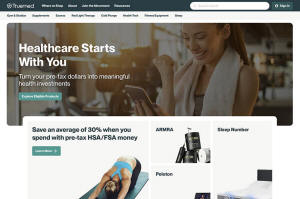Top RFK Jr. aide attacks US health system while running company that
promotes wellness alternatives
[June 11, 2025]
By MATTHEW PERRONE
WASHINGTON (AP) — Calley Means has built a following within the “Make
America Healthy Again” movement by railing against the failings of the
U.S. health system, often pinning the blame on one issue: corruption.
Means, a top aide to Health Secretary Robert F. Kennedy Jr., was hired
as a White House adviser in March. He has used that perch to attack the
nation’s leading physician groups, federal agencies and government
scientists, claiming they only protect their own interests in the
nation’s $4.9 trillion-a-year industry.
In recent interviews, speeches and podcasts he has called the American
Medical Association “a pharma lobbying group,” labeled the Food and Drug
Administration “a sock puppet of industry," and said federal health
scientists have “overseen a record of utter failure.”
Means, however, has his own financial stake in the sprawling health
system. He’s the co-founder of an online platform, Truemed, that offers
dietary supplements, herbal remedies and other wellness products. Some
of the vendors featured on Truemed’s website are supporters of Kennedy’s
MAHA movement, which downplays the benefits of prescription drugs,
vaccines and other rigorously tested medical products.
Kennedy has pledged to run the Department of Health and Human Services
with “radical transparency,” but Means has never had to publicly
disclose his own financial details or where exactly they intersect with
the policies he's advancing.

“It reeks of hypocrisy,” said Dr. Reshma Ramachandran, a health
researcher at Yale University. “In effect, he is representing another
industry that is touting nonregulated products and using his platform
within the government to financially benefit himself.”
In a written statement, Means said his government work has not dealt
with matters affecting Truemed and has focused on issues like reforming
nutrition programs and pressuring companies to phase out food dyes.
“Pursuing these large-scale MAHA goals to make America healthy has been
the sole focus in my government work,” Means said.
Truemed helps users take tax-free money out of their health savings
accounts, or HSAs, to spend on things that wouldn’t normally qualify as
medical expenses, such as exercise equipment, meal delivery services and
homeopathic remedies — mixtures of plants and minerals based on a
centuries-old theory of medicine that's not supported by modern science.
The business model caught the attention of the IRS last year, which
issued an alert: “Beware of companies misrepresenting nutrition,
wellness and general health expenses as medical care.”
Truemed co-founder and CEO, Justin Mares, said in a statement the
company is “in full alignment” with IRS guidelines.
“Truemed enables patients to work with providers to use medical funds
for root cause interventions like exercise and vitamin D to reverse
disease under current law,” Mares said.
The full extent of Means’ potential conflicts — including his personal
investments— are unclear because of his status as a special government
employee.
Unlike presidential appointees and other senior officials, special
government employees are temporary staffers who do not have to leave
companies or sell investments that could be impacted by their work.
Also, their financial disclosure forms are shielded from public release.
“It’s a big problem,” says Richard Painter, a former White House ethics
lawyer under George W. Bush now at the University of Minnesota. Painter
and other experts have raised alarms over a whirlwind of Trump
administration actions to dismantle the government’s public integrity
guardrails.

Still, part-time government employees are subject to the same law that
bars all federal staffers from working on issues that could directly
benefit their finances. When such cases arise, they must recuse
themselves or risk criminal penalties.
Means regularly opines on matters before HHS, including rethinking the
use of drugs for depression, weight loss, diabetes and other conditions.
Recently he's been promoting a new government report that calls for
scaling back prescription medications in favor of exercise, dietary
changes and other alternatives.
“If we rely less on our medical system, less on drugs, it necessitates
the spiritual, cultural conversation about what we’re doing to our
children’s bodies,” Means said in a recent podcast appearance.
Experts note that government ethics rules are intended to both prevent
financial conflict violations, but also the appearance of such conflicts
that might undermine public trust in government.
“If I were running the ethics office over at HHS, I sure as heck
wouldn’t want anybody going around giving interviews and speeches about
government matters that could have an effect on their own financial
interests,” Painter said.
A rising star in the MAHA movement
Means’ rapid rise reflects the seeming contradictions within the MAHA
movement itself, which urges followers to distrust both big corporations
and the government agencies which regulate them.
Means rails against big pharma and food conglomerates, two industries
that he says he spent years working for as a consultant in Washington.
Means has no medical training. A graduate of Harvard Business School, he
previously ran a bridal gown startup with his wife. On Wednesday, he's
scheduled to be the keynote speaker at FDA's annual science forum,
according to a copy of the program shared with The Associated Press.
He traces his passion for health care reform to the death of his mother
from pancreatic cancer in 2021. Shortly thereafter, Means and his
sister, Dr. Casey Means, took psychedelics together and had “a
mind-blowing, life-changing experience,” which led them to co-author a
wellness book, launch separate health startups and begin appearing on
podcasts.
Casey Means was recently nominated to be surgeon general and has faced
scrutiny over her qualifications, including an unfinished medical
residency.

[to top of second column]
|

This Friday, May 30, 2025, image shows part of the website of the
company TrueMed, which was co-founded by Calley Means, a top aide to
Health Secretary Robert F. Kennedy Jr. (AP Photo)
 Asked about her nomination,
President Donald Trump said: “Bobby thought she was fantastic,”
adding that he did not know her.
Meanwhile, her brother has stepped up his rhetoric for the MAHA
agenda, recently declaring that Kennedy has “a spiritual mandate to
reform our broken system."
While promoting the administration’s accomplishments, Means does not
shy away from plugging his own brand or those of his business
partners.
When asked to offer health advice to listeners of a sports podcast,
Outkick The Show, in April, Means said: “Read our book, ‘Good
Energy.’”
He also recommended blood tests sold by Function Health, which
provides subscription-based testing for $500 annually. The company
was cofounded by Dr. Mark Hyman, a friend of Kennedy and an investor
in Truemed, which also offers Hyman's supplements through its
platform. Casey Means is also an investor in Hyman's company.
“If you’re sick, most likely you have some kind of nutrient
deficiency, some kind of biomarker that you can actually then target
with your diet and your supplements,” Calley Means said.
Like dietary supplements, the marketing claims on laboratory tests
sold by Hyman are not approved by the FDA. The agency has warned for
years about the accuracy of such tests and tried to start regulating
them under President Joe Biden.
Experts say MAHA entrepreneurs like Hyman are following a playbook
common to the wellness industry: Identify a health concern, market a
test to diagnose it and then sell supplements or other remedies to
treat it.
“It ends up favoring these products and services that rest on flimsy
grounds, at the expense of products that have actually survived a
rigorous FDA approval process,” said Dr. Peter Lurie, a former FDA
official who is now president of the Center for Science in the
Public Interest.

Many of the items sold via Truemed, including sweat tents, cold
plunge tanks and light therapy lamps, wouldn’t typically qualify as
medical expenses under rules for HSAs, tax-free accounts created by
Congress to manage medical costs.
The IRS generally states that HSA purchases must help diagnose,
cure, treat, mitigate or prevent disease.
Truemed allows users to request a “letter of medical necessity” from
a doctor, stating that the product in question could have medical
value for them. Like other telehealth services, there’s usually no
real-time communication with the patient. The physician reviews a
“simple survey solution,” filled out by the Truemed user, according
to the company’s website.
Industry representatives say customers should be careful.
“You need to be prepared to defend your spending habits under
audit,” said Kevin McKechnie, head of the American Bankers
Association’s HSA council. “Companies are popping up suggesting they
can help you manage that process and maybe they can — so the debate
continues.”
Americans have an estimated $147 billion in HSA accounts, a
potential windfall for companies like Truemed that collects fees for
transactions made using their platforms.
Means sees an even bigger opportunity — routing federal funds out of
government programs and into more HSAs.
“The point of our company is to steer medical dollars into flexible
spending,” Means told fitness celebrity Jillian Michaels, on her
podcast last year. “I want to get that $4.5 trillion of Medicare,
Medicaid, everything into a flexible account.”
Who benefits most from HSAs?
Means’ pitch for expanding HSAs echoes two decades of Republican
talking points on the accounts, which were created in 2003 to
encourage Americans in high-deductible plans to be judicious with
their health dollars.
But HSAs have not brought down spending, economists say. They are
disproportionately used by the wealthiest Americans, who have more
income to fund them and a bigger incentive to lower their tax rate.
Americans who earn more than $1 million annually are the group most
likely to make regular HSA contributions, according to an analysis
by the nonprofit Center on Budget and Policy Priorities. More than
half Americans with HSAs have balances less than $500.

Trump’s “One Big Beautiful Bill” would further expand HSA purchases,
making gym memberships and other fitness expenses eligible for
tax-free spending. That provision alone is expected to cost the
government $10 billion in revenue.
“These are really just tax breaks in the guise of health policy that
overwhelmingly benefit people with high incomes,” said Gideon
Lukens, a former White House budget official during the Obama and
Trump administrations, now with the Center on Budget and Policy
Priorities.
Expanding HSA eligibility was listed as a goal for a coalition of
MAHA entrepreneurs and Truemed partners, founded by Means, which
lobbied Congress last year, according to the group's website.
Means said in a statement that the group focused only on broad
topics like “health care incentives and patient choice — but did not
lobby for specific bills.”
In total, the HSA expansions in Trump's bill are projected to cost
the federal government $180 billion over the next 10 years. As HSAs
expand to include more disparate products and services, Lukens says
the U.S. government will have fewer dollars to expand medical
coverage through programs like Medicaid.
“We have a limited amount of federal resources and the question is
whether we want to spend that on health and wellness products that
may or may not be helpful for wealthy people,” Lukens said.
All contents © copyright 2025 Associated Press. All rights reserved |